Faculty-Led Ideas to Strengthen Democracy in 2024
Presented by the Center for Artistic Activism and Project Pericles
As campus educators, how can we help students overcome mental and logistical challenges to make sure their voices are heard in this major election year? By embedding creative civic learning in the classroom!
Faculty across the nation are incorporating artistic activism and innovative voter education into their courses that are challenging — and positively changing — their students’ outlook on and involvement in the political process. The 2024 election year is a key time for more faculty to influence students’ political participation, locally and nationally.
On Monday, May 13th, we presented Creative Civic Learning: Faculty-Led Ideas to Strengthen Democracy in 2024, a special online event in partnership with Project Pericles. Featuring Faculty Fellows from our Unstoppable Voters program and Project Pericles, the event focused on how Fellows have overcome student apathy, partnered with community organizations, and implemented creative civic work in unexpected disciplines to have a huge impact on young voters’ lives.
Catch the recording and read the key takeaways below to be inspired by stories from faculty representing a range of disciplines, and get tools and insight into how you can support student youth voting in 2024.
Event Recording
Key Takeaways
Faculty Fellows shared these key learnings from implementing creative civic engagement and artistic activism lessons into their classes:
“Incorporating creative civic engagement elements really does provide a more innovative and culturally relevant experience for students. It also gives them a more personal and more profound learning experience, and the possibilities of integrating the arts as it relates to an interdisciplinary approach are truly unlimited.”
Dorcas McCoy, Associate Professor of International Relations and Comparative Politics, Bethune-Cookman University, Florida and Project Pericles Faculty Fellow
“I was really struck by how hungry our students are for creativity, for the kind of engagement of spirit that happens when you incorporate creativity into advocacy work and addressing problems at a systemic level.”
Margit Berman, Associate Professor of Clinical Psychology, Augsburg University, Minnesota, Assistant Professor of Psychiatry, Geisel School of Medicine, Dartmouth, New Hampshire, and Unstoppable Voters Faculty Fellow
To overcome student apathy:
- Find unifying traits and values amongst students to generate collective agency: Make it a team sport, so to speak, rather than an individual act.
- Demystify the voting process: Students have shared, “everybody’s screaming at us to vote. But we don’t even know how it works.”
- Step back and approach student apathy, hesitation, and disdain by taking time to really listen to one another and to each student’s personal story.
- Have hard conversations in joyful environments, like around a welcoming table with food and coffee.
To build power with community:
- Reach out to community organizations who care about the student vote and offer beneficial resources.
- Practice active listening to recognize diverse experiences, strengths, resources, and perspectives of the many amazing civic engagement organizations in the community.
- Engage with organizations that provide experiential learning activities that get students out of the traditional classroom.
- Work in a way that’s transformational, not transactional.
To work in unexpected disciplines:
- Develop a resource guide for different entry points and action steps students can take on civic issues.
- Forge alliances and friendships with other disciplines and communities who may be able to help.
- Utilize resources, materials, and lessons from the Center for Artistic Activism and Project Pericles to help shake up siloed disciplinary thinking and make big dreams and goals feel doable and attainable.
- Students are artists and activists across disciplines. Know there is no such thing as an unexpected discipline in this work!
Resources
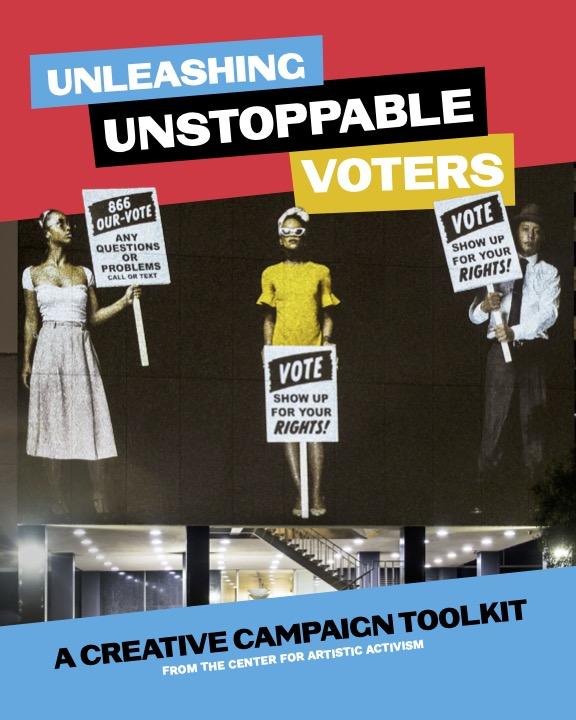
Our Unleashing Unstoppable Voters creative campaign toolkit has exercises, tools, case studies, and more to help you move forward throughout your campaign process. Faculty across the nation are already using it — download your free copy today!
I learned so much this semester. I was really unprepared for the level of both apathy and feelings of helplessness in the students as we began. They presented what I thought was a real challenge. But using the resources and the toolkit that the Center for Artistic Activism has provided really started to shift and transform the way that we went about this.
– Susan L Smith, Associate Research Professor of Art and Graduate Coordinator of the Intermedia Programs, University of Maine and Unstoppable Voters Faculty Fellow

Visit StudentVote.org for voter registration tools to support your campus’ civic engagement efforts.

Looking for advice on how to embed creative civic engagement and artistic activism lessons in your curriculum? Schedule a free happy hour session with the Unstoppable Voters team!

Check out civic engagement resources Project Pericles offers for faculty across all disciplines and apply for their Civic and Voter Engagement Fellowship.
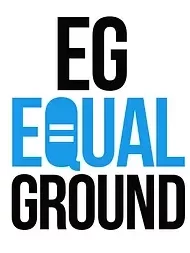
Equal Ground offers civic engagement field experiences that take students out and beyond the classroom.
Stay up to date on our programming, resources, events, and more!
Featured Speakers

David Aipperspach
Assistant Professor of Art and Art History in Painting and Printmaking, Ursinus College, Pennsylvania
David Aipperspach is an artist based in Philadelphia. He earned an M.F.A. in Painting from the Rhode Island School of Design and a B.A. in Landscape Architecture from the University of California, Berkeley. His work has been exhibited nationally in a variety of gallery and institutional contexts including CHART Gallery (New York, NY), Helen J Gallery (Los Angeles, CA), the Woodmere Art Museum (Philadelphia, PA), the RISD Museum (Providence, RI), West Chester University, UC Berkeley, and elsewhere. He is the recipient of multiple grants and awards including fellowships for residencies at Anderson Ranch Arts Center (Snowmass, CO) and the Vermont Studio Center (Johnson, VT.). His work has been reviewed in Title Magazine, Maake Magazine, and The Philadelphia Inquirer. David has been teaching at Ursinus since 2015.

Margit Berman
Associate Professor of Clinical Psychology, Augsburg University, Minnesota and Assistant Professor of Psychiatry, Geisel School of Medicine, Dartmouth, New Hampshire
Margit I. Berman, Ph.D., LP, is an Associate Professor of Clinical Psychology at Augsburg University and Assistant Professor of Psychiatry at the Geisel School of Medicine at Dartmouth. She trains future clinical psychologists, sees clients in private practice, and conducts research to develop socially just psychological interventions. She is the author of A Clinician’s Guide to Acceptance-Based Approaches for Weight Concerns: The Accept Yourself! Framework(Routledge, 2018) and A Workbook of Acceptance-Based Approaches for Weight Concerns: The Accept Yourself! Framework (Routledge, 2018). She received the 2021 National Council of Schools and Programs of Professional Psychology’s President’s Leadership Award for her work developing and launching the Clinical Psychology PsyD Training Program at Augsburg University. She is interested in helping psychologists develop their social justice advocacy skills, and is a 2024 Unstoppable Voters Faculty Fellow with the Center for Artistic Activism.
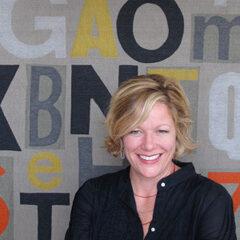
Kristin Hughes
Professor of Design, Carnegie Mellon University, Pennsylvania
Kristin Hughes, a Professor at Carnegie Mellon University’s School of Design since 2001, focuses her creative endeavors on integrating design with informal learning, public health, and placemaking strategies. Her work exemplifies the potential of design thinking and participatory methods to address complex societal challenges through innovative, human-centered solutions.

Dorcas McCoy
Associate Professor of International Relations and Comparative Politics, Bethune-Cookman University, Florida
Dr. Dorcas E. McCoy, a tenured Associate Professor of International Relations and Comparative Politics at Bethune-Cookman University, earned a Bachelor’s in Broadcast Journalism, a Master’s in Political Science from Florida A&M University, and a PhD in International Relations from Washington State University. Exemplifying a dedication to lifelong learning, she is currently pursuing a Master’s in Educational Leadership at Harvard University, slated for graduation on May 24, 2024. Dr. McCoy is a distinguished researcher and author with notable contributions in grants, peer-reviewed journals, and publications. She is recognized as a Periclean faculty leader and serves as President of the International Women’s Council, a nonprofit women’s group spanning 500 chapters across the United States and 17 countries.

Alexandra Prince
Assistant Professor of Religious Studies, Skidmore College, New York
Alexandra Leah Prince is a historian of American religions and Assistant Professor in the Religious Studies Department at Skidmore College in Saratoga Springs, NY. Their teaching and research focuses on the cultural history of minority American and Indigenous religions and the social study of insanity from a mad studies perspective. Currently, they are completing their first book project, which explores how bio-psychiatric interpretations of religion came to dominate popular understandings of new religious movements over the long 19th century.
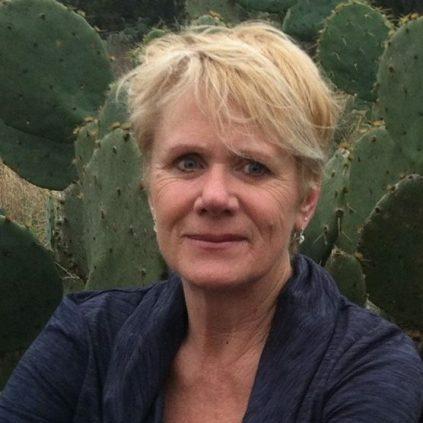
Susan L Smith
Associate Research Professor of Art and Graduate Coordinator of the Intermedia Programs, University of Maine, Maine
Susan L Smith, is a practicing artist and educator, Associate Research Professor of Art, and Graduate Coordinator of the Intermedia Programs at the University of Maine. Smith’s research is situated within issues of land/power and questions concerning extractivist practices, economic and climate forced migration. Her practice encompasses community- based collaboration, and site-based research. Smith believes the physical work is not the art, but an “artifact,” the art lies in the process of immersion and witness of place and community. Recent work focuses on work at the southern border, on riverbanks and industrial sites contaminated with PFAS chemicals, and a project of fruit tree reforestation and pollinator seed library. Susan is currently developing “uprooted collective” as a vehicle to create work that focuses on stewardship and interdependency as a way to imagine an alternative future.


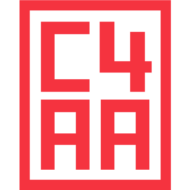

You must be logged in to post a comment.